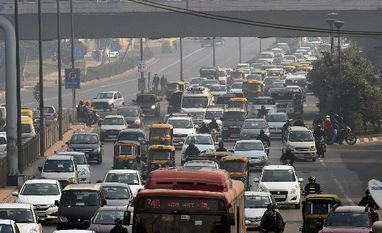A ambitious odd-even plan for vehicles has kicked off from 8 am in Delhi today. The plan, devised by the Arvind Kejriwal led Delhi government is on a 15-day trial and is aimed to reduce vehicular pollution in the capital city which is at an all time high, and is often compared with Beijing, the most polluted city in the world.
Only odd-numbered cars can be driven on Delhi streets today if you are not on the multiple exemption lists released by the government last week.
Partnering with Twitter, the delhi transport department has also advised commuters to tweet @TransportDelhi to get real time information on shortest routes
And the first challans to those found violating the rule have already been issued by the traffic police. The fine for violating the rule is Rs 2000.
But with no clear idea on the increase in the number of commuters availing of its services during the implementation of the odd-even scheme, the Delhi Metro hopes its 70 additional trips daily for a fortnight from January 1 will suffice.
"The trips will be increased during non-peak hours whereas the frequency is anyways two minutes during peak rush hours," a Delhi Metro Rail Corporation (DMRC) source said on Thursday.
Though rough estimates say the Delhi Metro trains will ferry an additional 4-5 lakh commuters every day during the implementation of the odd-even scheme in the national capital, officials IANS spoke to had no clear idea on how many extra commuters will use the system on days they are not allowed to use their cars.
"We cannot put a number to it," said the official.
The Metro rail will not be able to add additional coaches on existing trains as new ones are scheduled to be delivered only by December 2016.
More From This Section
"We will try our best with the facilities we have in hand. Usually, there is a slump in ridership between 11 a.m. and 4 p.m.; we will increase the frequency of service during that time slot," the official said.
Odd-numbered cars will be allowed to ply on odd dates and even-numbered cars on even dates, barring Sundays when all cars will be allowed.
Compressed Natural Gas-run cars with special stickers, public buses, CNG auto-rickshaws, two-wheelers, women drivers and VIP vehicles, among others, are exempted.
A Delhi Metro Rail Corporation statement said: "From January 1 to January 15, the DMRC will run a total of 3,192 trips against 2,827 trips during the similar period in January 2015. The DMRC will run 198 trains daily to achieve the targetted trips."
Empty auto-rickshaws were few and difficult to spot in areas of South Delhi on Friday morning, according to a Business Standard reporter. The metro's yellow line, during the 9-10 am period, also saw greater footfall at certain stations.
)